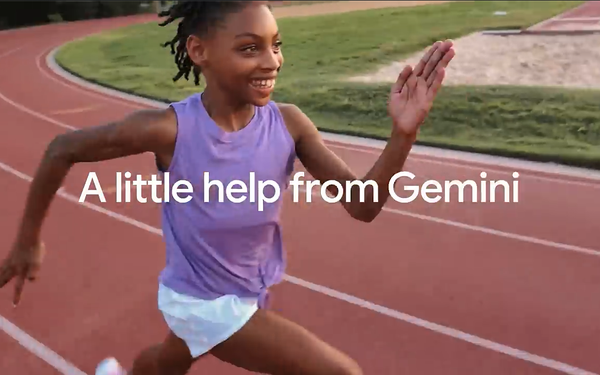
Google debuted the campaign ‘Dear
Sydney’ during the opening ceremony in the Paris 2024 Olympics, putting the spotlight on a little girl who loves to run and her idol, 24-year-old Sydney McLaughlin -- a track star who set a
world record in the 400-meter hurdles in 2021.
The ad focuses on the young girl's dreams of surpassing McLaughlin’s record. The young girl's father, who narrates the story in the ad,
helps his daughter write a letter to her hero, the track athlete, using Gemini, Google's AI platform. Google is Team USA’s Official Search AI Partner.
In the spot, Google highlights how
AI Overviews and Gemini can inspire the aspirations of a young girl.
Is this the correct thing to teach your children -- how to use technology to write a letter for you? The beauty of writing
a letter is to put thoughts and feelings into your own words.
advertisement
advertisement
I love technology, but I'm not sure my mother would have approved of me using something like this to write the zillions of thank
you notes and letters of appreciation I labored over during my lifetime. From an early age, my mother made sure I wrote my own notes each time someone gave me a present, did something nice for me, or
when there was a need for me to reach out to someone.
Technological advancements have put doubt in people's minds, making it difficult for some to accept or believe what they are capable of
doing or not doing on their own.
“We believe that AI can be a great tool for enhancing human creativity, but can never replace it,” a Google spokesperson wrote in an email to
Performance Marketing Insider. “Our goal was to create an authentic story celebrating Team USA. It showcases a real-life track enthusiast and her father, and aims to show how the Gemini
app can provide a starting point, thought starter, or early draft for someone looking for ideas for their writing.”
Despite the negativity the ad has seen online, Google's "Dear Sydney"
-- the ad testing firm System1, which rates TV ads on their potential to drive long-term growth for brands -- has received a star rating of 4.4 on a scale of 1.0 to 5.9, which the company described as
"strong."
I agree with Shelly Palmer that the father
in Google's Olympic ad does not encourage his daughter to express herself, and that AI is taking the place of a very critical human skill, although the ad never made me want to scream. It just
reinforced my way of teaching my grandchildren how to be creative and to write a thought, a feeling, a letter, and tell a story.
Isn't that what ads should do -- tell a story?
One day,
during my most recent visit to California, I sat down with my granddaughter to help her write a story. I asked her what she wanted to write about. And when she told me, I told her to write it down.
She then read me a line. I asked, what happened next? She told me, and read me the line after she wrote it down.
This went on for about 30 minutes. At the end of those 30 minutes, I
asked her to read me everything she had written on the page. And when she did, the one-page story, written completely from her own imagination, lived on the lines of that 8x10 sheet of
paper.
Ironically, as a side note, she knows about Google's Chromebook because her class uses it in school. Children can be technically savvy without stifling their creativity.
For creatives looking to improve performance for that ad copy or marketing material, remember to look inside yourself to ask "and then what happened" to tell your brand's story.
"Then what
happened?" is the key to storytelling.
The end... until tomorrow.